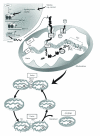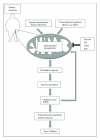Mitochondrial dysregulation in the pathogenesis of diabetes: potential for mitochondrial biogenesis-mediated interventions
- PMID: 22203837
- PMCID: PMC3235780
- DOI: 10.1155/2012/642038
Mitochondrial dysregulation in the pathogenesis of diabetes: potential for mitochondrial biogenesis-mediated interventions
Abstract
Muscle mitochondrial metabolism is a tightly controlled process that involves the coordination of signaling pathways and factors from both the nuclear and mitochondrial genomes. Perhaps the most important pathway regulating metabolism in muscle is mitochondrial biogenesis. In response to physiological stimuli such as exercise, retrograde signaling pathways are activated that allow crosstalk between the nucleus and mitochondria, upregulating hundreds of genes and leading to higher mitochondrial content and increased oxidation of substrates. With type 2 diabetes, these processes can become dysregulated and the ability of the cell to respond to nutrient and energy fluctuations is diminished. This, coupled with reduced mitochondrial content and altered mitochondrial morphology, has been directly linked to the pathogenesis of this disease. In this paper, we will discuss our current understanding of mitochondrial dysregulation in skeletal muscle as it relates to type 2 diabetes, placing particular emphasis on the pathways of mitochondrial biogenesis and mitochondrial dynamics, and the therapeutic value of exercise and other interventions.
Figures



References
-
- Kraegen EW, Clark PW, Jenkins AB, Daley EA, Chisholm DJ, Storlien LH. Development of muscle insulin resistance after liver insulin resistance in high-fat-fed rats. Diabetes. 1991;40(11):1397–1403. - PubMed
-
- Russell JC, Shillabeer G, Bar-Tana J, et al. Development of insulin resistance in the JCR:LA-cp rat: role of triacylglycerols and effects of MEDICA 16. Diabetes. 1998;47(5):770–778. - PubMed
Publication types
MeSH terms
Substances
Grants and funding
LinkOut - more resources
Full Text Sources
